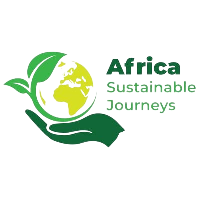At Africa Sustainable Journeys (ASJ), we recognize the profound impact of tourism on local communities, the environment, and the economy. We are committed to responsible tourism practices that benefit both our guests and the destinations we operate in. This Sustainable Tourism Policy outlines our commitment to sustainable tourism, guiding our approach to minimizing environmental, social, and economic impacts.
Article I: Environmental Responsibility
Clause 1.1: Reduction of Environmental Footprint ASJ implements environmentally friendly practices across its operations, including energy-efficient lighting, digital documentation to reduce paper usage, recycling, and responsible water use.
Clause 1.2: Sustainable Transportation and Operations. We promote sustainable transport options, such as electric/hybrid vehicles and bicycles. A 1% donation from each tour supports the Climate Impact Portfolio, contributing to SDG 13 (Climate Action).
Clause 1.3: Conservation-Oriented Partnerships ASJ encourages eco-certified accommodations, supports natural resource conservation, and promotes waste management programs.
Article II: Social Responsibility
Clause 2.1: Cultural Preservation. We respect and celebrate local cultures, providing cultural sensitivity training to staff and ensuring guests are educated on local customs.
Clause 2.2: Community SupportWe partner with local entrepreneurs, schools, and artisans, and provide fair wages and ethical sourcing practices.
Clause 2.3: Guest Recognition Travelers receive STI-certified sustainable travel certificates upon completion of their journey, aligned with SDG 8 (Decent Work and Economic Growth).
Article III: Economic Responsibility
Clause 3.1: Local Economic Empowerment. ASJ creates income-generating opportunities, promotes fair pricing, and prioritizes local procurement.
Clause 3.2: Capacity Building and DevelopmentWe invest in training, entrepreneurship support, and equitable distribution of tourism benefits.
Article IV: Implementation and Monitoring
Clause 4.1: Operational Integration. We integrate sustainability into our operations, train staff and partners, and engage stakeholders.
Clause 4.2: Performance Assessment. We conduct audits and sustainability reviews and establish a dedicated committee to oversee implementation.
Article V: Guest Responsibilities
Clause 5.1: Responsible Behavior. Guests are expected to respect cultures, follow provided guidelines, and support local enterprises.
Clause 5.2: Active Participation. We encourage guests to engage in sustainability activities and provide travel guides and briefings.
Article VI: Supply Chain Responsibilities
Clause 6.1: Supplier Vetting. We select suppliers through rigorous evaluation of environmental, ethical, and community standards.
Clause 6.2: Partnership Commitments. Partners must uphold conservation, labor, and cultural preservation principles.
Clause 6.3: Monitoring and Collaboration. We use guest feedback and regular communication to sustain partnerships and enhance performance.
Article VII: Emergency Response
Clause 7.1: Preparedness and Training. ASJ maintains an emergency response plan, supported by BAR SOS. Annual staff training and guest briefings are mandatory.
Clause 7.2: Emergency Support Systems. BAR SOS provides real-time monitoring, air evacuations, and satellite-enabled communication.
Clause 7.3: Response Procedures. We follow structured protocols for initial response, evacuation, support, and coordination with authorities.
Article VIII: Community Project Funding Model
Clause 8.1: Impact Allocation: 5% of each booking is donated post-trip to a guest-selected community project.
Clause 8.2: Transparency and Tracking: Donors receive updates on donations and impact stories.
Clause 8.3: Project Options: Guests may support any of our listed community programs/projects including the Batwa Healthcare, Rural Schools, Teenage Mothers, Nkumba Dance Group, or Goats for Gorillas, etc.
Clause 8.4: Engagement and Access. Project visits are subject to prior approval and child protection compliance.
Article IX: Stakeholder Engagement
Clause 9.1: Local Participation. We consult local communities through meetings and partnerships, ensuring alignment with local priorities.
Article X: Transparency and Accountability
Clause 10.1: Reporting and Auditing. We publish annual reports, conduct internal/external audits, and gather stakeholder feedback.
Clause 10.2: Client Impact Reports. Personalized impact reports and updates are shared with clients.
Article XI: Employee Training
Clause 11.1: Partnerships and Programs. We partner with UWA, AUTO, USAGA, Tourism Cares, CBI, and Visit Rwanda for staff training.
Clause 11.2: Continuous Capacity Building. Ongoing workshops and evaluations ensure staff uphold sustainability values.
Article XII: Guest Education
Clause 12.1: Information Access. We provide pre-trip guides, in-trip briefings, and sustainable travel materials.
Clause 12.2: Sustainable Practices. We encourage water conservation, eco-product use, wildlife protection, and community immersion.
Article XIII: Local Economic Development
Clause 13.1: Inclusive Growth. We empower local businesses, especially women-led enterprises, and create community-driven tourism products.
Clause 13.2: Procurement and Pricing: We source goods locally and ensure fair trade principles are applied.
Article XIV: Cultural Heritage Preservation
Clause 14.1: Promotion of Heritage Sites. ASJ promotes cultural sites in Uganda and Rwanda, including museums, trails, and shrines.
Clause 14.2: Cultural Investments. We support artisans, sponsor festivals, and collaborate with schools for heritage education.
Article XV: Child Protection Policy
Clause 15.1: Zero Tolerance Policy. We prohibit child exploitation, orphanage tourism, and labor.
Clause 15.2: Guidelines for Interaction Guests must not interact with or photograph children without consent and approval.
Clause 15.3: Reporting and Compliance Incidents must be reported to local authorities and ASJ’s Sustainable Impact Officer.
Clause 15.4: Prohibiting partnerships with orphanages and tourists visits to schools.
Clause 15.5: Actively support the cause to strengthen families and build local communities.
Clause 15.6: Banning inappropriate photography or interactions with children.
Clause 15.6: Volunteering Limitations, School volunteering is tightly regulated and requires prior approval from the Head of Community education and Training.
Clause 15.7: Staff Training Regular training on child protection is mandatory for all staff and community related partners.
Article XVI: Continuous Improvement
Clause 16.1: Policy Review: We update our policy annually and incorporate guest and stakeholder feedback.
Clause 16.2: Commitment Statement. By implementing this policy, ASJ commits to minimizing harm and maximizing benefits across tourism sectors in the regions we operate.
